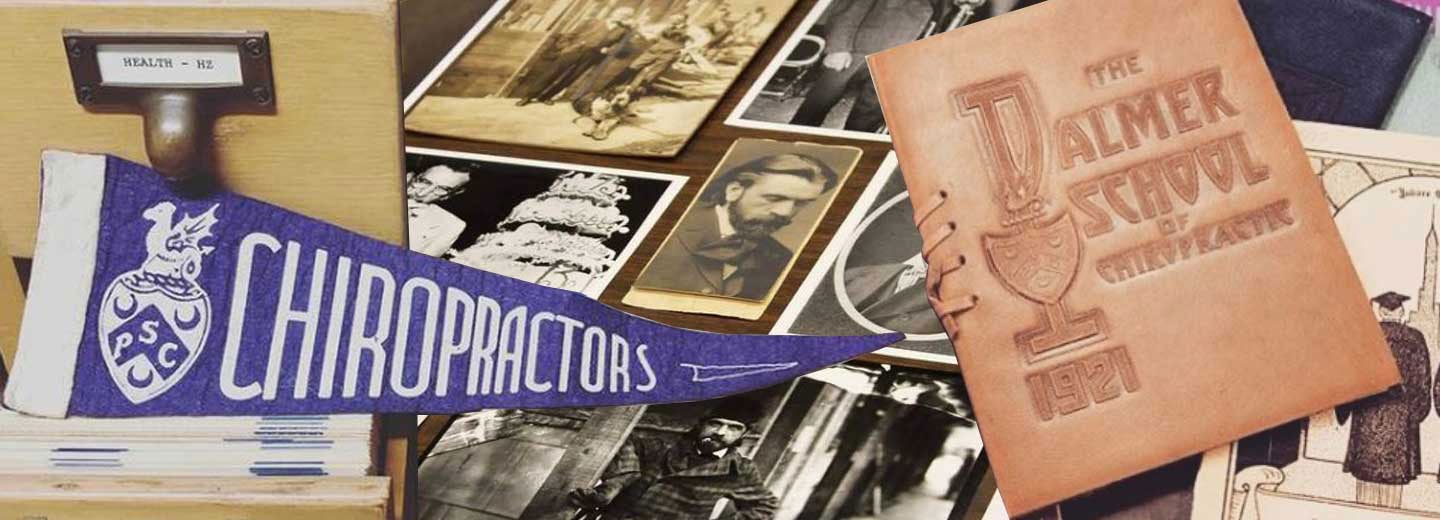Special Collections and Archives gratefully accepts select donations of books, papers, and audiovisual materials. Donations are given professional care and secure storage. Items are then made available for historical research unless otherwise indicated by the donor.
What to Donate
What We Accept
Listed below are examples of the types of materials that are often valuable to researchers:
- Correspondence
- Early books/journals
- Memoirs/diaries
- Scrapbooks
- Speeches/lectures
- Meeting minutes/reports
- Brochures and fliers
- Awards/certificates
- Photographs
- Audiovisual materials
- Small memorabilia items such as pins/buttons
What We Do Not Accept
- Books with heavy mold or mildew
- Books that are physically dirty
- Books previously owned by us, but discarded
- Bones
- Chiropractic equipment (ie. tables)
How to Donate
Information We Need
- Your name and address
- Description of the materials donated
- Anything you can tell us about how you acquired these materials
- If you have photographs, please identify them with a pencil or an archival pen, or provide us with that information so we can include it with the collection.
How to Make an Item Donation
Please contact us by email or phone to arrange dropping off a donation in person or through the mail.
What We Do with Your Donation
Assessment of Materials
Acceptance of gifts will be determined by the following criteria:
- Do the materials fit within the scope of the Special Collections and Archives mission?
- Are they chiropractic, or part of a related health-care field?
- Do they fill in a gap in our collection?
- Are these materials beneficial to researchers?
- Do we already have these materials?
Acceptance of materials
- Donated materials that fit within our scope will be added to the collection.
- We will send a letter of acknowledgment for your donation and deed of gift.
- The materials will be arranged, cataloged, and preserved.
Items will be made accessible to researchers at Palmer, the Chiropractic community, and the general public (unless otherwise stipulated in the deed of gift).
Removal of Materials
Donated items that are damaged or do not fit within the scope of the collection will be sold, given away, transferred to another library, or discarded.
Appraisals and Tax Deductions
- The library does not appraise donations or attest in any way to the value of the materials for legal reasons.
- If donors want an appraisal, they need to make their own arrangements before delivering the materials to Special Collections and Archives.
- We are unable to provide receipts for tax purposes.
Deed of Gift
The deed of gift is a form you will be required to sign once you donate an item.
The components that make up a deed of gift:
- Name and address of the donor
- Title and description of the materials donated
- Transfer of ownership
The deed of gift is a formal and legal agreement between the donor and Special Collections and Archives that transfers ownership of and legal rights of the donated materials to Palmer College of Chiropractic.
Access and Copyright
Our goal is to make our collections open and available for research use. However, sometimes it is necessary for a donor or Special Collections and Archives to restrict access to all or a portion of the materials for a limited and clearly stated period.
Copyright
- Generally, copyright belongs to the creator of the writings and other original materials (i.e. photos) but can be legally transferred to others.
- Ownership of copyright is separate from ownership of the physical item (the letter or photo).
- We ask you to not only donate the physical items but any copyright that the donor might own.
- Item copyright donation enables researchers to use the donated materials in their work.

